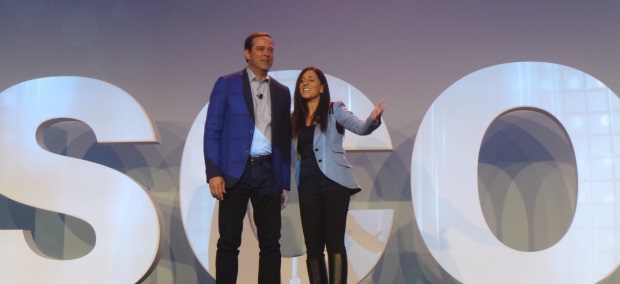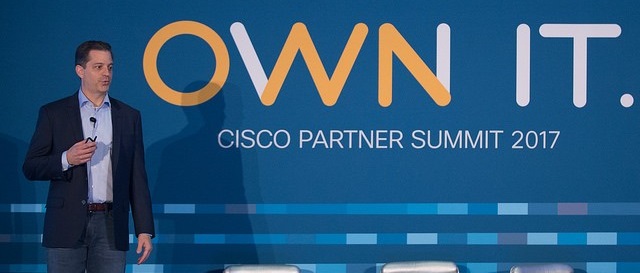DALLAS – If you ask any Cisco executive about the small and mid-size business market they will tell you it’s always been an important sector. But, Cisco Systems has had many priorities that have usurped the SMB over the years; leading to channel partner frustration. This may be changing as the networking giant listed its priority markets for 2018 at the 2017 Cisco Partner Summit and it included – the SMB.
Besides SMB, Cisco listed Commercial, Global Enterprise, Service Provider, and Web Scale. Web Scale is new and the economics are with disaggregation, scalability and operational efficiency.
There are two main reasons for the renewed focus by Cisco. The first is on automation. The San Jose, Calif.-based vendor is making several bets on automation sweeping the market in the future and this includes SMB and Commercial segments. Also, Cisco now has Meraki and has put a different value proposition to Meraki based on making those solutions simple to use. David Goeckeler, the executive vice president & GM of Cisco’s networking and security business, said people in the SMB don’t need to have all the software skills for building a network. “They just want a network.”
Company CEO Chuck Robbins said it wasn’t really appropriate to say Cisco abandoned the SMB, but the growth with Meraki is a great example of what those customers want to see from the vendor. When Cisco acquired Meraki it had bookings of under $100 million and now it has surpassed the billion dollar mark. “That portfolio resonates,” Robbins said. “And, we built a different set of products for certain markets that are in the SMB. Partners should have been frustrated before, but I hope they see we have refocused on it.”
Another signal that Cisco will expand its offerings in the SMB is its recent acquisition of BroadSoft. Rowan Trollope, senior vice president and GM of Applications Group for Cisco, said BroadSoft is a reflection that Cisco is serious about the SMB as most of the BroadSoft business is for small companies with less than 50 lines.
“We are keen to see that technology bolster ours. The business model is based on the SMB and solution providers are an effective way to go to market in that area.
Chris Dedicoat, EVP of Cisco sales, also weighed in on SMB saying the sector is one of the biggest growth opportunities for the company going forward.
Meraki proved to Dedicoat that these acquisitions can leverage the large channel ecosystems Cisco has built up since 2001. Before Cisco acquired Meraki they were not that visible to the channel.
“The convergence of the voice business gave us an initial reaction that we needed to go out and recruit all the voice partners. We then realized our current partner base pick up the technology and integrated it themselves and they started building practices around voice. That has been true with everything we have brought to market,” he said.
Another important factor to consider in Cisco’s new SMB push is the acquisition by Synnex of Westcon-Comstor. Comstor is a Cisco-only value-added distributor. And, Synnex is a distributor with a focus on the SMB.
Joe Cozzolino, SVP of Cisco Services, said SMB in the tier two model is an opportunity to add services and get them working with Westcon-Comstor/Synnex to add new services capability. Currently, the tier two channel are not selling services where it is in support and professional. The large distributors have been working to develop these types of practices to help their get to the SMB.
Dedicoat sees a connection with the tier two channel players and the services providers through distribution. “I think the distribution play is working well getting these two together. And, this is not all things software either and includes the devices. What’s important is to get real knowledge and understanding on that part of the business. It has tremendous opportunity to evolve if they are able to help the channel understand the value of activation and renewing practices. This still has to change but we are encouraged with the work we are doing through distribution with the partners in the tier two environment. We feel this will be critical to long term success,” Dedicoat said.
Cisco Canada channel chief Mark Collins told CDN that it’s still early days for Cisco and Synnex in the relationship. Collins has noticed that Synnex has put a heavy focus on analytics for the SMB and sub-segmenting the market to find out the right partners to work with.
He also was impressed with the way Synnex Canada packages offerings for the SMB that focuses on the needs of the partner where some of the costs have been off-loaded such as staging and configuration. “This is smart because the focus is on selling to the customer and lowering the cost for the partner on the back end,” Collins said.





